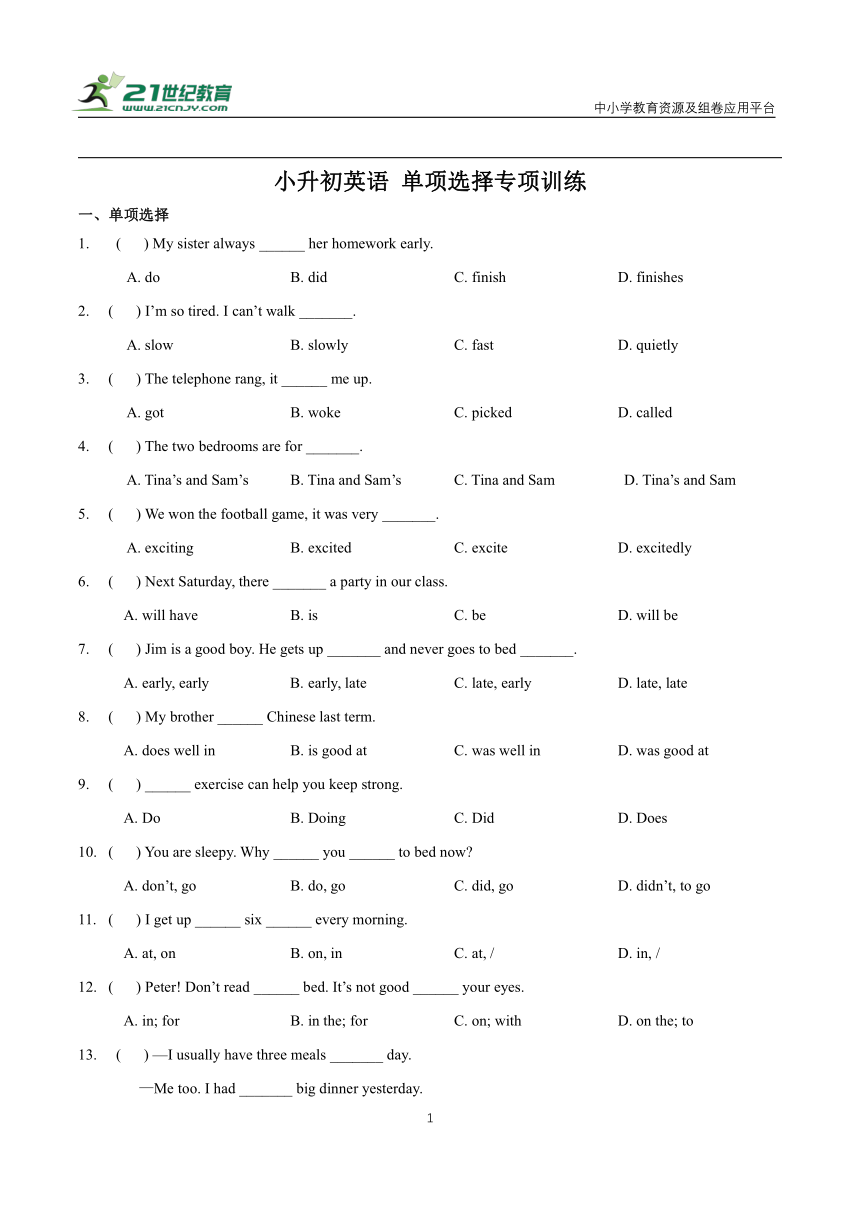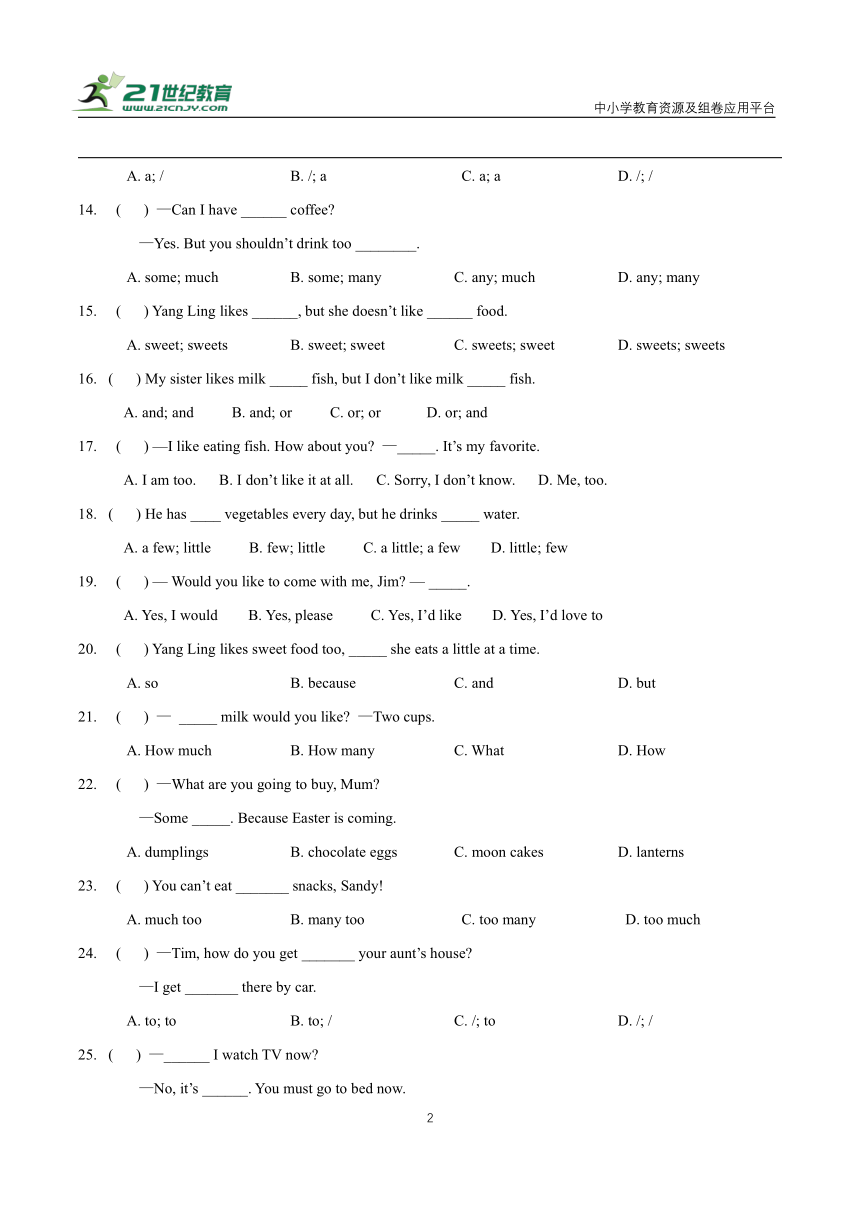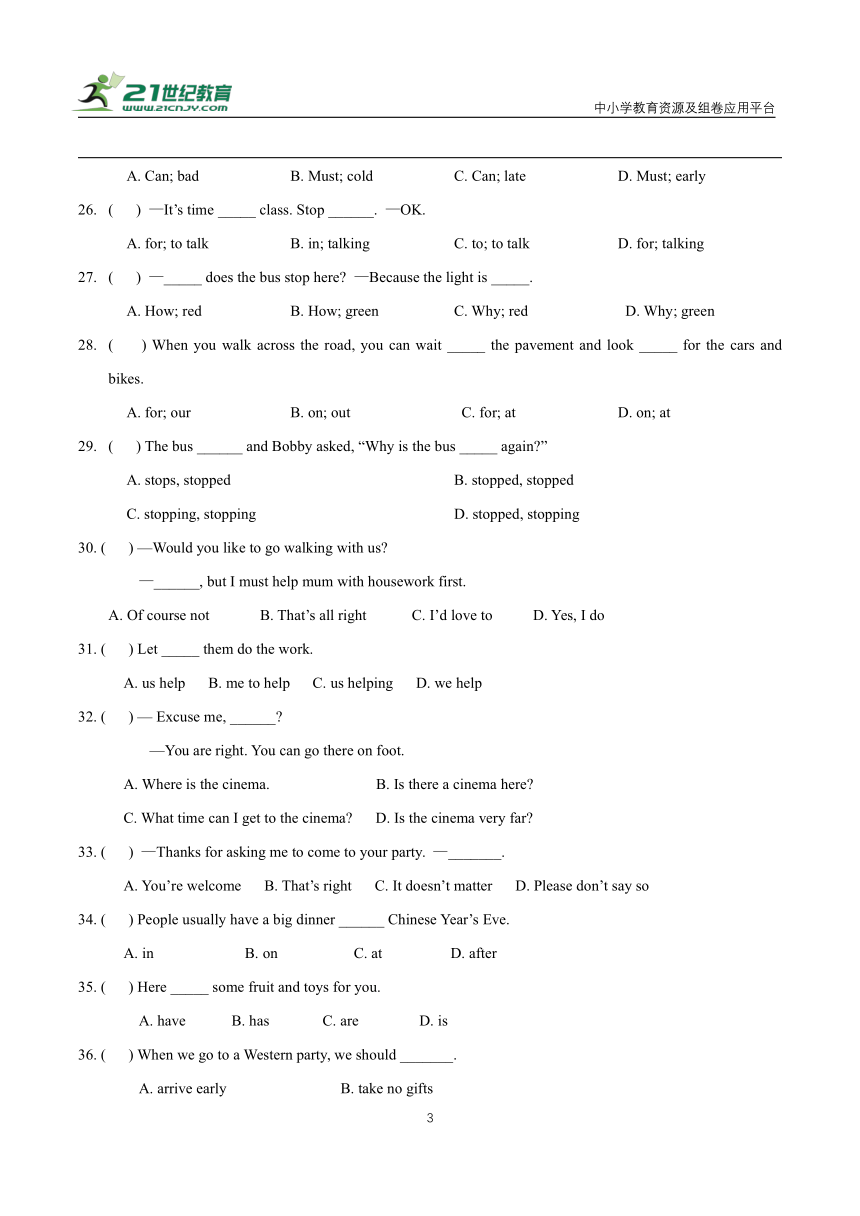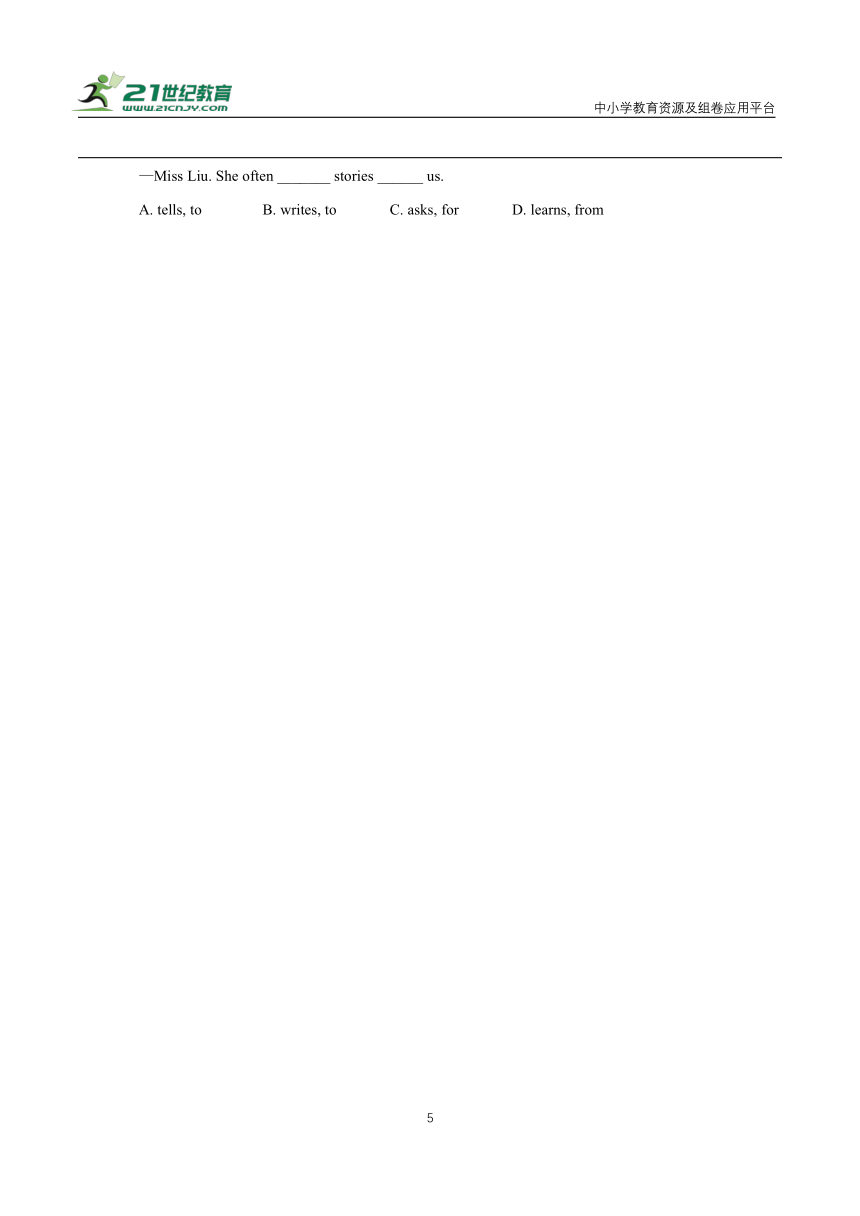译林版 备战2023年 小升初英语 单项选择专项训练(含答案)
文档属性
| 名称 | 译林版 备战2023年 小升初英语 单项选择专项训练(含答案) |  | |
| 格式 | docx | ||
| 文件大小 | 147.9KB | ||
| 资源类型 | 试卷 | ||
| 版本资源 | 牛津译林版 | ||
| 科目 | 英语 | ||
| 更新时间 | 2023-06-06 14:49:38 | ||
图片预览





文档简介
中小学教育资源及组卷应用平台
小升初英语 单项选择专项训练
一、单项选择
( ) My sister always ______ her homework early.
A. do B. did C. finish D. finishes
( ) I’m so tired. I can’t walk _______.
A. slow B. slowly C. fast D. quietly
( ) The telephone rang, it ______ me up.
A. got B. woke C. picked D. called
( ) The two bedrooms are for _______.
A. Tina’s and Sam’s B. Tina and Sam’s C. Tina and Sam D. Tina’s and Sam
( ) We won the football game, it was very _______.
A. exciting B. excited C. excite D. excitedly
( ) Next Saturday, there _______ a party in our class.
A. will have B. is C. be D. will be
( ) Jim is a good boy. He gets up _______ and never goes to bed _______.
A. early, early B. early, late C. late, early D. late, late
( ) My brother ______ Chinese last term.
A. does well in B. is good at C. was well in D. was good at
( ) ______ exercise can help you keep strong.
A. Do B. Doing C. Did D. Does
( ) You are sleepy. Why ______ you ______ to bed now
A. don’t, go B. do, go C. did, go D. didn’t, to go
( ) I get up ______ six ______ every morning.
A. at, on B. on, in C. at, / D. in, /
( ) Peter! Don’t read ______ bed. It’s not good ______ your eyes.
A. in; for B. in the; for C. on; with D. on the; to
( ) —I usually have three meals _______ day.
—Me too. I had _______ big dinner yesterday.
A. a; / B. /; a C. a; a D. /; /
( ) —Can I have ______ coffee
—Yes. But you shouldn’t drink too ________.
A. some; much B. some; many C. any; much D. any; many
( ) Yang Ling likes ______, but she doesn’t like ______ food.
A. sweet; sweets B. sweet; sweet C. sweets; sweet D. sweets; sweets
( ) My sister likes milk _____ fish, but I don’t like milk _____ fish.
A. and; and B. and; or C. or; or D. or; and
( ) —I like eating fish. How about you —_____. It’s my favorite.
A. I am too. B. I don’t like it at all. C. Sorry, I don’t know. D. Me, too.
( ) He has ____ vegetables every day, but he drinks _____ water.
A. a few; little B. few; little C. a little; a few D. little; few
( ) — Would you like to come with me, Jim — _____.
A. Yes, I would B. Yes, please C. Yes, I’d like D. Yes, I’d love to
( ) Yang Ling likes sweet food too, _____ she eats a little at a time.
A. so B. because C. and D. but
( ) — _____ milk would you like —Two cups.
A. How much B. How many C. What D. How
( ) —What are you going to buy, Mum
—Some _____. Because Easter is coming.
A. dumplings B. chocolate eggs C. moon cakes D. lanterns
( ) You can’t eat _______ snacks, Sandy!
A. much too B. many too C. too many D. too much
( ) —Tim, how do you get _______ your aunt’s house
—I get _______ there by car.
A. to; to B. to; / C. /; to D. /; /
( ) —______ I watch TV now
—No, it’s ______. You must go to bed now.
A. Can; bad B. Must; cold C. Can; late D. Must; early
( ) —It’s time _____ class. Stop ______. —OK.
A. for; to talk B. in; talking C. to; to talk D. for; talking
( ) —_____ does the bus stop here —Because the light is _____.
A. How; red B. How; green C. Why; red D. Why; green
( ) When you walk across the road, you can wait _____ the pavement and look _____ for the cars and bikes.
A. for; our B. on; out C. for; at D. on; at
( ) The bus ______ and Bobby asked, “Why is the bus _____ again ”
A. stops, stopped B. stopped, stopped
C. stopping, stopping D. stopped, stopping
30. ( ) —Would you like to go walking with us
—______, but I must help mum with housework first.
A. Of course not B. That’s all right C. I’d love to D. Yes, I do
31. ( ) Let _____ them do the work.
A. us help B. me to help C. us helping D. we help
32. ( ) — Excuse me, ______
—You are right. You can go there on foot.
A. Where is the cinema. B. Is there a cinema here
C. What time can I get to the cinema D. Is the cinema very far
33. ( ) —Thanks for asking me to come to your party. —_______.
A. You’re welcome B. That’s right C. It doesn’t matter D. Please don’t say so
34. ( ) People usually have a big dinner ______ Chinese Year’s Eve.
A. in B. on C. at D. after
35. ( ) Here _____ some fruit and toys for you.
A. have B. has C. are D. is
36. ( ) When we go to a Western party, we should _______.
A. arrive early B. take no gifts
C. arrive a few minutes late D. leave early
37. ( ) Just then, the rain _______.
A. stopped B. is stopping C. stops D. is going to stop
38. ( ) ______ you ______ basketball tomorrow afternoon
A. Do, play B. Are, playing C. Are, going to play D. Will, playing
39. ( ) ______ the window and you can see the colorful flowers.
A. Look out B. Look out of C. Look for D. Look at
40. ( ) Let’s ______ a play on Christmas Day.
A. put on B. put off C. put up D. try on
41. ( ) —Shall we play football together —_________.
A. Yes, we shall B. No, we can’t C. All right D. That’s right
42. ( ) —______ will you stay in Beijing — For one month.
A. How B. How long C. How far D. How often
43. ( ) My uncle _____ Suzhou last week.
A. will go back to B. went back C. goes back to D. went back to
44. ( ) You will find Niagara Falls in _______.
A. Australia B. Canada C. the US D. the UK
45. ( ) Helen wants to be a ______ and she is talking about her ______ plans with Yang Ling.
A. traveler, traveled B. travelled, traveler
C. traveler, travel D. traveler, travelling
46. ( ) We learn a lot ______ the UK at school.
A. from B. about C. for D. at
47. ( ) —______ was your trip —It _______ great fun.
A. What, is B. How, was C. Where, was D. When, is
48. ( ) —What do you often do after school
—I often listen to music. It always makes me ______.
A. happily B. angrily C. happy D. angry
49. ( ) —Who is your favourite teacher
—Miss Liu. She often _______ stories ______ us.
A. tells, to B. writes, to C. asks, for D. learns, from
答案解析
答案D
本题考查的是一般现在时的时间状语。当遇到always,often,sometimes等词表示经常性发生的动作时,用一般现在时,主语又是第三人称单数,故选D。
答案C
本题考查副词。根据句意可知我很累,不能走得快,A和B是慢的意思,D是安静的意思,都与句意不符,故选C。
答案B
考查动词词义。根据句意可知电话铃声响了,它把我吵醒了。A是get up 起床,C是pick up开车接某人,D是call up 带电话给某人,只有B符合句意,故选B。
答案A
本题考查名词所有格。根据句意可知是有两间卧室,是分别所有,所以人名后要分别加上’s。句意是这两间卧室是为蒂娜和萨姆的。故选A。
答案A
本题考查excite的用法。exciting是形容词,修饰物,令人兴奋的;excited也是形容词,修饰人,感到兴奋的;excite是动词,使兴奋;excitedly是副词,兴奋地。根据句意可知我们赢了这场足球赛,这太令人兴奋了。后面的it代指前面的足球赛,所以是物,故选A。
答案D
本题考查一般将来时和There be句型结合的用法。根据next Saturday可知,题干用将来时,排除B和C选项。句意是说下周六我们班会有一场派对,there和be动词结合构成有的意思,will后用动词原形,故选D。
答案B
本题考查副词。Early是早的意思,而late是晚的意思。根据句意可知吉姆是个好孩子,他早早起床,并且从不晚睡,故选B。
答案D
本题考查一般过去时及短语搭配。根据last term可知用一般过去时,排除A和B选项。擅长短语的搭配是be good at或者是do well in,故选D。
答案B
本题考查动名词。当句子的主语是做某事时,需选动名词做主语。句意是做锻炼可以帮助你保持强壮。故选B。
答案A
本题考查一般疑问句。由前半句及后面的now可知后面句子选用一般现在时,排除C和D选项。句意是你很困,为什么现在不去睡觉呢?故选A。
答案C
本题考查时间介词。点时间前面用介词at,排除B和D选项。当遇到every,next等词修饰morning,afternoon和evening时,前面的时间介词需省略。故选C。
答案A
本题考查介词搭配。in bed指躺在床上,侧重躺这个动作;而in the bed指躺在被窝里,侧重床的睡觉功能;on the bed指在床上,侧重某件东西的方位,所以第一空用in bed。第二空考查的是对…有益/害这一短语,搭配介词是for。故选A。
答案C
本题考查冠词。第一空根据句意可知我通常一天吃三顿饭,所以用不定冠词a; 当早、中、晚饭前有形容词修饰时,需选用不定冠词;如果没有的话则不填。故选C。
答案A
本题考查不定代词。Some用于肯定句,any用于否定句和疑问句,但当句子是表示请求、建议的意思时,疑问句中的some不用换成any,所以第一空用some,排除C和D选项;第二空根据句意可知你不应该喝太多咖啡,因为咖啡是不可数名词,所以用much。故选A。
答案C
本题考查sweet的用法。sweet有两种词性,既可作形容,表示甜的;又可作可数名词,表示糖果。根据句意可知杨玲喜欢糖果,但她不喜欢甜食。故选C。
答案B
本题考查连词。and用于肯定句,or用于否定句和疑问句。前半句是肯定句用and,后半句是否定句用or。故选B。
答案D
本题考查情景交际。根据句意可知我喜欢吃鱼,你呢?答句是它是我的最爱,说明回答的这个人也喜欢。B项是我一点也不喜欢;C是我不知道;D是我也是。故选D。
答案A
本题考查不定代词。a little和a few表示肯定,有一些,a little修饰不可数名词,而a few修饰可数名词复数;little和few表示否定,几乎没有,little修饰不可数名词,而few修饰可数名词复数。根据题干当中的but可知需填一组反义词,vegetable是可数名词,而water是不可数名词。故选A。
答案D
本题考查情景交际。Would you like to do sth 的肯定回答是Yes, I’d like / love to。故选D。
答案C
本题考查连词。根据句意可知杨玲也喜欢甜食,并且一次吃一些。A和B选项表因果关系,D项表转折关系。故选C。
答案A
本题考查特殊疑问词。根据题干当中的milk可知,milk是不可数名词,对其提问用how much。如果是对two cups of milk中的two提问,则用how many。故选A。
答案B
本题考查节日所对应的食物。问句是问要买什么?根据答句可知Easter是复活节,所以是买一些巧克力蛋。A项是饺子,中国春节的食物;C项是月饼,中国中秋节的食物;D项是南瓜,西方万圣节的食物。故选B。
答案C
本题考查不定代词。根据题干中的snack是可数名词,所以需选用修饰可数名词的不定代词,too many和too much都是太多的意思,many修饰可数名词,而much修饰不可数名词,much too是形容词,相当于too。故选C。
答案B
本题考查介词。get to意思是到达,后接名词时,需加上介词to;但当后面出现的是there,here,home等地点副词时,则省略介词to。故选B。
答案C
本题考查情态动词和形容词。can表请求,而must表必须,所以第一空填can,排除B和D选项。根据答句你现在必须去睡觉了可知现在太晚了。故选C。
答案D
本题考查It’s time…句型和固定搭配。到了…的时候后若直接是跟名词,则搭配介词for;若后面出现动词,则搭配介词to。因为class是名词,故第一空填for,排除B和C选项。Stop后有两种搭配,一是stop to do sth,意思是停下来去做另一件事;而stop doing sth,意思是停止正在做的事情。根据句意可知到了上课时间了,停止谈话。故选D。
答案C
本题考查特殊疑问词。根据答句里的because可知是在问原因,故第一空填why,排除A和B选项。句意是公共汽车为什么停在这儿?因为灯是红色的。故选C。
答案B
本题考查介词搭配。根据句意可知当过马路的时候,你可以在人行道上等,并且小心汽车和自行车。
wait on the pavement在人行道上等;而wait for the pavement 等人行道,故第一空填on,排除A和C选项。当心是look out for,look at 是看的意思,故选B。
答案D
本题考查时态。根据前半句里的and可知横线上的动词形式应与ask保持一致,所以应选用一般过去时,排除A和C选项。后半句里的is表示这辆公共汽车目前正处于停止的状态,所以用进行时表示这个动作正在发生。故选D。
答案C
本题考查情景交际。问句是说你愿意和我们一起步行吗?答句是说但我必须先帮我妈妈做完家务,说明回答的人愿意。A选项意思是当然不;B选项意思是没关系;C选项意思是我很乐意;D选项意思是一般疑问句的肯定回答。故选C。
答案A
本题考查固定搭配。让某人做事的表达方式是let sb do sth,排除B和C选项。因为let是动词,动词后面接宾格。故选A。
答案B
本题考查情景交际。根据答句You are right可知,是问这有没有一家电影院。故选B。容易误选D。
答案A
本题考查对于谢谢的应答语。小学常用的是You’re welcome; That’s all right。B选项意思是那是对的;C选项意思是没关系,用于对不起的应答语;D选项意思是请不要那样说。故选A。
答案B
本题考查介词。in用在年、季节、月及早中晚前;on用在具体的某一天;at用于点时刻;after表示在…之后。Chinese Year’s Eve意思是除夕,是具体的某一天。故选B。
答案D
本题考查倒装句的动词单复数形式。当here放于句首时,后面若跟两个名词,那么动词的单复数形式采取就近原则。本题的some fruit是不可数名词,则动词用单数形式。故选D。
答案C
本题考查常识。根据句意可知我们是去一个西方派对,应该要晚到几分钟。故选C。切记不要和中国的思维习惯混淆。
答案A
本题考查时态。根据just then就在那时可知动作是发生在过去。故选A。注意stop 的过去式是双写p加ed。
答案C
本题考查时态。根据tomorrow afternoon可知动作还未发生,用一般将来时,排除A和B选项。Be going to 和will 后面都接动词原形。故选C。
答案B
本题考查look的短语搭配。look out向外看;look out of… 朝….向外看;look for寻找;look at看。根据句意可知是说朝窗户外看,你就能看见五颜六色的花。故选B。
答案A
本题考查词组辨析。put on 穿上;上演;put off 推迟;put up张贴;try on试穿。根据句意可知让我们在圣诞节上演一出戏剧。故选A。
答案C
本题考查Shall we… 的应答语。正确的肯定回答是all right;否定回答是I’m afraid not。故选C。
答案B
本题考查特殊疑问词。How是对方式提问;how long是对一段时间提问;how far是对距离提问;how often是对频率提问。根据答句一个月可知问句是对一段时间提问。句意是你将在北京待多久?一个月。故选B。
答案D
本题考查时态。根据last week可知是用一般过去时,排除A和C选项。当go back后出现名词时需加介词to。故选D。
答案B
本题考查常识。Niagara Falls是尼日加拉瀑布,位于加拿大。故选B。
答案C
本题考查travel的变形。Travel既可作动词旅行,也可作名词旅行,traveler作名词旅行者;旅行计划是travel plans。句意是海伦想要成为一名旅行者,她正和杨玲谈论她的旅行计划。故选C。
答案B
本题考查介词搭配。learn from… 从…中学到…;learn about 了解。根据句意可知我们在学校了解很多关于英国的情况。故选B。
答案B
本题考查特殊疑问词及时态。根据问句里的was可知是一般过去时,所以第二空应用was,排除A和D。根据答句旅行很件乐事可知问句是问你的旅行怎么样?故选B。
答案C
本题考查make的搭配。make后面接形容词,所以排除A和B选项。根据句意可知你放学后经常做什么?我经常听音乐,说明音乐让我开心。故选C。
答案A
本题考查动词辨析。根据句意可知我最喜欢的刘老师经常给我们讲故事。故选A。C选项意思是向…寻求帮助。
2
小升初英语 单项选择专项训练
一、单项选择
( ) My sister always ______ her homework early.
A. do B. did C. finish D. finishes
( ) I’m so tired. I can’t walk _______.
A. slow B. slowly C. fast D. quietly
( ) The telephone rang, it ______ me up.
A. got B. woke C. picked D. called
( ) The two bedrooms are for _______.
A. Tina’s and Sam’s B. Tina and Sam’s C. Tina and Sam D. Tina’s and Sam
( ) We won the football game, it was very _______.
A. exciting B. excited C. excite D. excitedly
( ) Next Saturday, there _______ a party in our class.
A. will have B. is C. be D. will be
( ) Jim is a good boy. He gets up _______ and never goes to bed _______.
A. early, early B. early, late C. late, early D. late, late
( ) My brother ______ Chinese last term.
A. does well in B. is good at C. was well in D. was good at
( ) ______ exercise can help you keep strong.
A. Do B. Doing C. Did D. Does
( ) You are sleepy. Why ______ you ______ to bed now
A. don’t, go B. do, go C. did, go D. didn’t, to go
( ) I get up ______ six ______ every morning.
A. at, on B. on, in C. at, / D. in, /
( ) Peter! Don’t read ______ bed. It’s not good ______ your eyes.
A. in; for B. in the; for C. on; with D. on the; to
( ) —I usually have three meals _______ day.
—Me too. I had _______ big dinner yesterday.
A. a; / B. /; a C. a; a D. /; /
( ) —Can I have ______ coffee
—Yes. But you shouldn’t drink too ________.
A. some; much B. some; many C. any; much D. any; many
( ) Yang Ling likes ______, but she doesn’t like ______ food.
A. sweet; sweets B. sweet; sweet C. sweets; sweet D. sweets; sweets
( ) My sister likes milk _____ fish, but I don’t like milk _____ fish.
A. and; and B. and; or C. or; or D. or; and
( ) —I like eating fish. How about you —_____. It’s my favorite.
A. I am too. B. I don’t like it at all. C. Sorry, I don’t know. D. Me, too.
( ) He has ____ vegetables every day, but he drinks _____ water.
A. a few; little B. few; little C. a little; a few D. little; few
( ) — Would you like to come with me, Jim — _____.
A. Yes, I would B. Yes, please C. Yes, I’d like D. Yes, I’d love to
( ) Yang Ling likes sweet food too, _____ she eats a little at a time.
A. so B. because C. and D. but
( ) — _____ milk would you like —Two cups.
A. How much B. How many C. What D. How
( ) —What are you going to buy, Mum
—Some _____. Because Easter is coming.
A. dumplings B. chocolate eggs C. moon cakes D. lanterns
( ) You can’t eat _______ snacks, Sandy!
A. much too B. many too C. too many D. too much
( ) —Tim, how do you get _______ your aunt’s house
—I get _______ there by car.
A. to; to B. to; / C. /; to D. /; /
( ) —______ I watch TV now
—No, it’s ______. You must go to bed now.
A. Can; bad B. Must; cold C. Can; late D. Must; early
( ) —It’s time _____ class. Stop ______. —OK.
A. for; to talk B. in; talking C. to; to talk D. for; talking
( ) —_____ does the bus stop here —Because the light is _____.
A. How; red B. How; green C. Why; red D. Why; green
( ) When you walk across the road, you can wait _____ the pavement and look _____ for the cars and bikes.
A. for; our B. on; out C. for; at D. on; at
( ) The bus ______ and Bobby asked, “Why is the bus _____ again ”
A. stops, stopped B. stopped, stopped
C. stopping, stopping D. stopped, stopping
30. ( ) —Would you like to go walking with us
—______, but I must help mum with housework first.
A. Of course not B. That’s all right C. I’d love to D. Yes, I do
31. ( ) Let _____ them do the work.
A. us help B. me to help C. us helping D. we help
32. ( ) — Excuse me, ______
—You are right. You can go there on foot.
A. Where is the cinema. B. Is there a cinema here
C. What time can I get to the cinema D. Is the cinema very far
33. ( ) —Thanks for asking me to come to your party. —_______.
A. You’re welcome B. That’s right C. It doesn’t matter D. Please don’t say so
34. ( ) People usually have a big dinner ______ Chinese Year’s Eve.
A. in B. on C. at D. after
35. ( ) Here _____ some fruit and toys for you.
A. have B. has C. are D. is
36. ( ) When we go to a Western party, we should _______.
A. arrive early B. take no gifts
C. arrive a few minutes late D. leave early
37. ( ) Just then, the rain _______.
A. stopped B. is stopping C. stops D. is going to stop
38. ( ) ______ you ______ basketball tomorrow afternoon
A. Do, play B. Are, playing C. Are, going to play D. Will, playing
39. ( ) ______ the window and you can see the colorful flowers.
A. Look out B. Look out of C. Look for D. Look at
40. ( ) Let’s ______ a play on Christmas Day.
A. put on B. put off C. put up D. try on
41. ( ) —Shall we play football together —_________.
A. Yes, we shall B. No, we can’t C. All right D. That’s right
42. ( ) —______ will you stay in Beijing — For one month.
A. How B. How long C. How far D. How often
43. ( ) My uncle _____ Suzhou last week.
A. will go back to B. went back C. goes back to D. went back to
44. ( ) You will find Niagara Falls in _______.
A. Australia B. Canada C. the US D. the UK
45. ( ) Helen wants to be a ______ and she is talking about her ______ plans with Yang Ling.
A. traveler, traveled B. travelled, traveler
C. traveler, travel D. traveler, travelling
46. ( ) We learn a lot ______ the UK at school.
A. from B. about C. for D. at
47. ( ) —______ was your trip —It _______ great fun.
A. What, is B. How, was C. Where, was D. When, is
48. ( ) —What do you often do after school
—I often listen to music. It always makes me ______.
A. happily B. angrily C. happy D. angry
49. ( ) —Who is your favourite teacher
—Miss Liu. She often _______ stories ______ us.
A. tells, to B. writes, to C. asks, for D. learns, from
答案解析
答案D
本题考查的是一般现在时的时间状语。当遇到always,often,sometimes等词表示经常性发生的动作时,用一般现在时,主语又是第三人称单数,故选D。
答案C
本题考查副词。根据句意可知我很累,不能走得快,A和B是慢的意思,D是安静的意思,都与句意不符,故选C。
答案B
考查动词词义。根据句意可知电话铃声响了,它把我吵醒了。A是get up 起床,C是pick up开车接某人,D是call up 带电话给某人,只有B符合句意,故选B。
答案A
本题考查名词所有格。根据句意可知是有两间卧室,是分别所有,所以人名后要分别加上’s。句意是这两间卧室是为蒂娜和萨姆的。故选A。
答案A
本题考查excite的用法。exciting是形容词,修饰物,令人兴奋的;excited也是形容词,修饰人,感到兴奋的;excite是动词,使兴奋;excitedly是副词,兴奋地。根据句意可知我们赢了这场足球赛,这太令人兴奋了。后面的it代指前面的足球赛,所以是物,故选A。
答案D
本题考查一般将来时和There be句型结合的用法。根据next Saturday可知,题干用将来时,排除B和C选项。句意是说下周六我们班会有一场派对,there和be动词结合构成有的意思,will后用动词原形,故选D。
答案B
本题考查副词。Early是早的意思,而late是晚的意思。根据句意可知吉姆是个好孩子,他早早起床,并且从不晚睡,故选B。
答案D
本题考查一般过去时及短语搭配。根据last term可知用一般过去时,排除A和B选项。擅长短语的搭配是be good at或者是do well in,故选D。
答案B
本题考查动名词。当句子的主语是做某事时,需选动名词做主语。句意是做锻炼可以帮助你保持强壮。故选B。
答案A
本题考查一般疑问句。由前半句及后面的now可知后面句子选用一般现在时,排除C和D选项。句意是你很困,为什么现在不去睡觉呢?故选A。
答案C
本题考查时间介词。点时间前面用介词at,排除B和D选项。当遇到every,next等词修饰morning,afternoon和evening时,前面的时间介词需省略。故选C。
答案A
本题考查介词搭配。in bed指躺在床上,侧重躺这个动作;而in the bed指躺在被窝里,侧重床的睡觉功能;on the bed指在床上,侧重某件东西的方位,所以第一空用in bed。第二空考查的是对…有益/害这一短语,搭配介词是for。故选A。
答案C
本题考查冠词。第一空根据句意可知我通常一天吃三顿饭,所以用不定冠词a; 当早、中、晚饭前有形容词修饰时,需选用不定冠词;如果没有的话则不填。故选C。
答案A
本题考查不定代词。Some用于肯定句,any用于否定句和疑问句,但当句子是表示请求、建议的意思时,疑问句中的some不用换成any,所以第一空用some,排除C和D选项;第二空根据句意可知你不应该喝太多咖啡,因为咖啡是不可数名词,所以用much。故选A。
答案C
本题考查sweet的用法。sweet有两种词性,既可作形容,表示甜的;又可作可数名词,表示糖果。根据句意可知杨玲喜欢糖果,但她不喜欢甜食。故选C。
答案B
本题考查连词。and用于肯定句,or用于否定句和疑问句。前半句是肯定句用and,后半句是否定句用or。故选B。
答案D
本题考查情景交际。根据句意可知我喜欢吃鱼,你呢?答句是它是我的最爱,说明回答的这个人也喜欢。B项是我一点也不喜欢;C是我不知道;D是我也是。故选D。
答案A
本题考查不定代词。a little和a few表示肯定,有一些,a little修饰不可数名词,而a few修饰可数名词复数;little和few表示否定,几乎没有,little修饰不可数名词,而few修饰可数名词复数。根据题干当中的but可知需填一组反义词,vegetable是可数名词,而water是不可数名词。故选A。
答案D
本题考查情景交际。Would you like to do sth 的肯定回答是Yes, I’d like / love to。故选D。
答案C
本题考查连词。根据句意可知杨玲也喜欢甜食,并且一次吃一些。A和B选项表因果关系,D项表转折关系。故选C。
答案A
本题考查特殊疑问词。根据题干当中的milk可知,milk是不可数名词,对其提问用how much。如果是对two cups of milk中的two提问,则用how many。故选A。
答案B
本题考查节日所对应的食物。问句是问要买什么?根据答句可知Easter是复活节,所以是买一些巧克力蛋。A项是饺子,中国春节的食物;C项是月饼,中国中秋节的食物;D项是南瓜,西方万圣节的食物。故选B。
答案C
本题考查不定代词。根据题干中的snack是可数名词,所以需选用修饰可数名词的不定代词,too many和too much都是太多的意思,many修饰可数名词,而much修饰不可数名词,much too是形容词,相当于too。故选C。
答案B
本题考查介词。get to意思是到达,后接名词时,需加上介词to;但当后面出现的是there,here,home等地点副词时,则省略介词to。故选B。
答案C
本题考查情态动词和形容词。can表请求,而must表必须,所以第一空填can,排除B和D选项。根据答句你现在必须去睡觉了可知现在太晚了。故选C。
答案D
本题考查It’s time…句型和固定搭配。到了…的时候后若直接是跟名词,则搭配介词for;若后面出现动词,则搭配介词to。因为class是名词,故第一空填for,排除B和C选项。Stop后有两种搭配,一是stop to do sth,意思是停下来去做另一件事;而stop doing sth,意思是停止正在做的事情。根据句意可知到了上课时间了,停止谈话。故选D。
答案C
本题考查特殊疑问词。根据答句里的because可知是在问原因,故第一空填why,排除A和B选项。句意是公共汽车为什么停在这儿?因为灯是红色的。故选C。
答案B
本题考查介词搭配。根据句意可知当过马路的时候,你可以在人行道上等,并且小心汽车和自行车。
wait on the pavement在人行道上等;而wait for the pavement 等人行道,故第一空填on,排除A和C选项。当心是look out for,look at 是看的意思,故选B。
答案D
本题考查时态。根据前半句里的and可知横线上的动词形式应与ask保持一致,所以应选用一般过去时,排除A和C选项。后半句里的is表示这辆公共汽车目前正处于停止的状态,所以用进行时表示这个动作正在发生。故选D。
答案C
本题考查情景交际。问句是说你愿意和我们一起步行吗?答句是说但我必须先帮我妈妈做完家务,说明回答的人愿意。A选项意思是当然不;B选项意思是没关系;C选项意思是我很乐意;D选项意思是一般疑问句的肯定回答。故选C。
答案A
本题考查固定搭配。让某人做事的表达方式是let sb do sth,排除B和C选项。因为let是动词,动词后面接宾格。故选A。
答案B
本题考查情景交际。根据答句You are right可知,是问这有没有一家电影院。故选B。容易误选D。
答案A
本题考查对于谢谢的应答语。小学常用的是You’re welcome; That’s all right。B选项意思是那是对的;C选项意思是没关系,用于对不起的应答语;D选项意思是请不要那样说。故选A。
答案B
本题考查介词。in用在年、季节、月及早中晚前;on用在具体的某一天;at用于点时刻;after表示在…之后。Chinese Year’s Eve意思是除夕,是具体的某一天。故选B。
答案D
本题考查倒装句的动词单复数形式。当here放于句首时,后面若跟两个名词,那么动词的单复数形式采取就近原则。本题的some fruit是不可数名词,则动词用单数形式。故选D。
答案C
本题考查常识。根据句意可知我们是去一个西方派对,应该要晚到几分钟。故选C。切记不要和中国的思维习惯混淆。
答案A
本题考查时态。根据just then就在那时可知动作是发生在过去。故选A。注意stop 的过去式是双写p加ed。
答案C
本题考查时态。根据tomorrow afternoon可知动作还未发生,用一般将来时,排除A和B选项。Be going to 和will 后面都接动词原形。故选C。
答案B
本题考查look的短语搭配。look out向外看;look out of… 朝….向外看;look for寻找;look at看。根据句意可知是说朝窗户外看,你就能看见五颜六色的花。故选B。
答案A
本题考查词组辨析。put on 穿上;上演;put off 推迟;put up张贴;try on试穿。根据句意可知让我们在圣诞节上演一出戏剧。故选A。
答案C
本题考查Shall we… 的应答语。正确的肯定回答是all right;否定回答是I’m afraid not。故选C。
答案B
本题考查特殊疑问词。How是对方式提问;how long是对一段时间提问;how far是对距离提问;how often是对频率提问。根据答句一个月可知问句是对一段时间提问。句意是你将在北京待多久?一个月。故选B。
答案D
本题考查时态。根据last week可知是用一般过去时,排除A和C选项。当go back后出现名词时需加介词to。故选D。
答案B
本题考查常识。Niagara Falls是尼日加拉瀑布,位于加拿大。故选B。
答案C
本题考查travel的变形。Travel既可作动词旅行,也可作名词旅行,traveler作名词旅行者;旅行计划是travel plans。句意是海伦想要成为一名旅行者,她正和杨玲谈论她的旅行计划。故选C。
答案B
本题考查介词搭配。learn from… 从…中学到…;learn about 了解。根据句意可知我们在学校了解很多关于英国的情况。故选B。
答案B
本题考查特殊疑问词及时态。根据问句里的was可知是一般过去时,所以第二空应用was,排除A和D。根据答句旅行很件乐事可知问句是问你的旅行怎么样?故选B。
答案C
本题考查make的搭配。make后面接形容词,所以排除A和B选项。根据句意可知你放学后经常做什么?我经常听音乐,说明音乐让我开心。故选C。
答案A
本题考查动词辨析。根据句意可知我最喜欢的刘老师经常给我们讲故事。故选A。C选项意思是向…寻求帮助。
2
